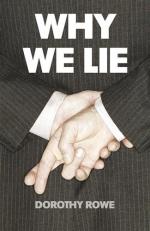Dorothy Rowe (2010) ISBN: 9780007278855
Psychoanalyst Dorothy Rowe is perhaps better known for The Successful Self, but I came to her writings and musing via her discussion of untruths and fibs, Why We Lie.
If I recall correctly I found Dorothy Rowe via an interview with Philip Adams on ABC Radio National’s Late Night Live and then later her Big Ideas talk. At the time of writing this the interview is still available and of course well worth listening to. Dorothy Rowe is the rare sort of scientist who merges compassion and philosophy with her approach to human psychology.
Why We Lie germinated as an idea when Dorothy was listening to bankers discuss the Global Financial Crisis in hindsight. There seemed to be so much shock that things could have been so rotten in the financial core, and yet all the warning signs had been there for months, maybe years. How could this be? How could the bankers have lied not only to their clients and each other, but to themselves, for so long? This led her to think about not just deception but self-deception about deception.
This is a very interesting and for some of us at least I suspect, a very challenging book. Dorothy Rowe’s main argument boils down to a few simple truths. The first is that even when we claim to be lying for someone else’s sake (not to upset them) we are really lying for ourselves. We want to avoid embarrassment, or an uncomfortable situation, or the potential loss of a friendship or a relationship. If you think back to the last time you remember really baldly lying (maybe it was as a child) probably there was a selfish motivation underneath, no matter how much you told yourself otherwise at the time.
Lying is a social tool – it lets you resolve social problems and sticky situations – but a person who lies often will eventually be tempted to start lying not when they desperately need to, but simply to achieve expediency. Eventually, people may start lying for no very good reason at all. It just becomes habit. You could have solved the problem another way entirely, but it was just slightly easier and intellectually a bit lazier to go with the ‘innocent’ lie. And a lie here is defined in its strictest sense. A half-truth, a white lie, a bending or massaging of the truth: all of these are lies for the purpose of this discussion.
Dorothy Rowe digs down into the question deeper and deeper through the book. She raises some startlingly clear and simple ideas about personal motivation – one that stuck with me was the idea that most people are either motivated by wanting to be liked by other people or wanting order in their life. She digs back into early childhood, which forms so much of the foundation of our unconscious adult existence, and she comes out of the book with some remarkable wisdom.
I highly recommend Why We Lie, although I warn you that if you are inclined to make your social world smoother and gentler and ‘happier’ through constant small half-truths you may well find this a difficult read. This book is above all else a remorseless examination of the dangers of lying to yourself. This will not be easy for everyone to read.


